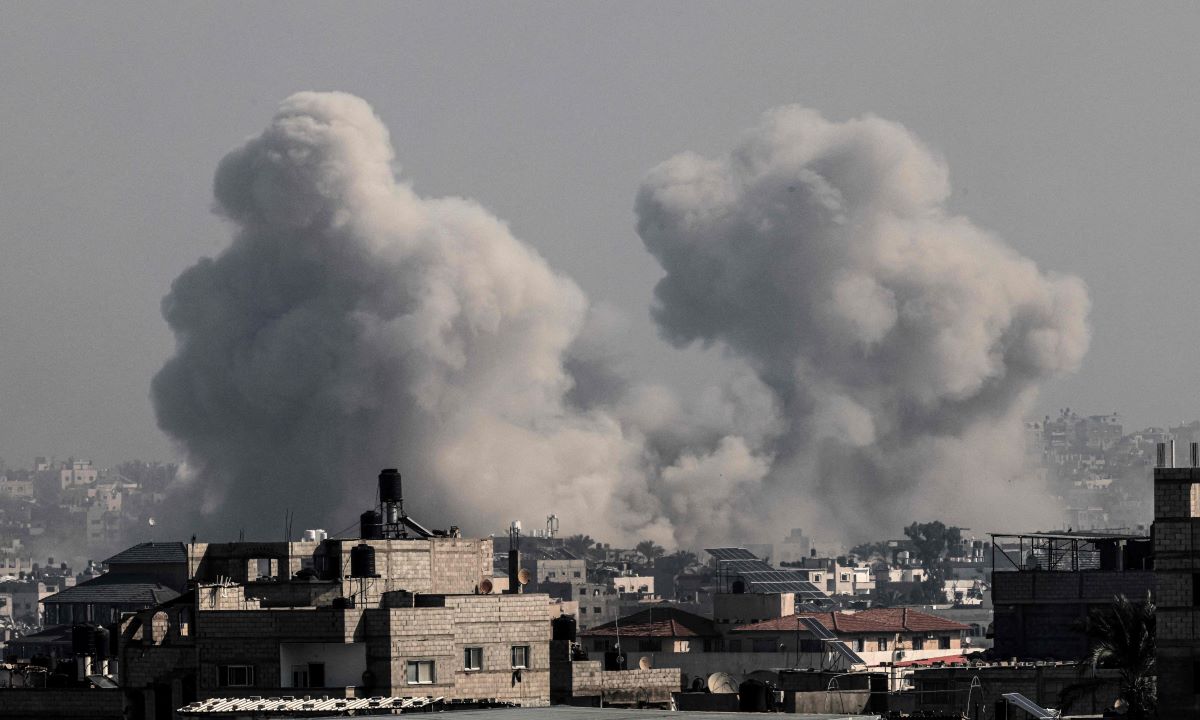Spillover effect of Gaza war heightens concerns; US 'hardly' plays a role of peacemaker

Smoke billows over the southern Gaza Strip during Israeli bombardment on December 17, 2023, amid continuing battles between Israel and Hamas. Photo: AFP
The aftermath of conflict in Gaza has seen its effects reverberate throughout the region as Hezbollah, the Lebanese military faction, launched 62 rockets at a significant Israeli military base on Saturday, which was described as a preliminary response to the assassination of the deputy chief of Hamas. Some experts said on Sunday that this act heightened concerns about the intensifying discord between US-backed Israel and what the Western media terms as the Axis of Resistance, an "anti-Israel coalition" informally led by Iran.
In an effort to mitigate these rising tensions, high-ranking Western officials, including US Secretary of State Antony Blinken and the EU's senior diplomat Josep Borrell, embarked on separate missions in the region. Their goal is to avert further escalations, not only in Lebanon but also along the critical Red Sea shipping lanes. However, some experts expressed skepticism about the effectiveness of these interventions as they argued that the inconsistent policies of the US undermine its ability to act as a peacemaker in easing the ongoing tensions.
Hezbollah has claimed responsibility for firing 62 rockets at a crucial Israeli military site, stating this action was an initial reaction to the recent killing of a Hamas leader in Beirut, Al Jazeera reported on Saturday.
Israel has made clear it views as untenable the regular exchange of fire between its forces and Hezbollah along the border, and that it may soon launch a major military operation in Lebanon, the Washington Post reported on Sunday.
The US media outlet also pointed out that US officials are concerned that Israeli Prime Minister Benjamin Netanyahu may see an expanded fight in Lebanon as key to his political survival amid domestic criticism of his government's failure to prevent the Hamas attack on October 7, 2023.
"The interests of the US and Israel in the Middle East have significantly diverged now," Sun Degang, director of the Center for Middle Eastern Studies at Fudan University, told the Global Times on Sunday.
Israel aims to capitalize on its recent victories to address security concerns in the north and potentially extend its military achievements. In this context, the visit of Blinken to the region is an attempt to calm the situation and stabilize the region, as the US does not hope to see an escalation of the conflict as it has to deal with the presidential election this year and does not want the Middle East to consume too much of its energy when its major focus is still on strategic competition with major powers such as Russia and China, Sun said.
Blinken is in Amman, Jordan, for meetings on local time Sunday as part of his visit to the region, The New York Times reported. He met his Turkish counterpart Hakan Fidan, as well as Turkish President Recep Tayyip Erdogan on Saturday, with whom Blinken discussed the need to keep the Gaza conflict from spreading. He also met with Greek Prime Minister Kyriakos Mitsotakis on the island of Crete.
This is also Blinken's fourth visit in three months to the region and he will also visit Qatar, the United Arab Emirates and Saudi Arabia on Sunday and Monday. Then he will visit Israel and the West Bank on Tuesday and Wednesday before wrapping up the trip in Egypt, the AP reported.
"During Blinken's visit, particularly in engaging with Jordan and Qatar, there was a clear attempt at mediation, as Jordan is closely connected to the Palestinian conflict, especially concerning refugee issues and aid," Liu Zhongmin, a professor at the Middle East Studies Institute of Shanghai International Studies University, told the Global Times on Sunday.
With the West Bank being a point of spillover, where Israel has intensified its operations recently, Jordan's role becomes even more pivotal. Qatar, previously instrumental in temporary cease-fires and hostage exchanges, also plays a significant role, Liu said.
These diplomatic gestures by the US aim to de-escalate the conflict. However, the US has consistently shown duplicity in its approach. For instance, in the Red Sea region, it has not sought de-escalation with the Houthi rebels but rather intensified attacks by forming a so-called escort alliance, the expert said.
US military forces shot down a drone early Saturday over the Red Sea in international waters near several commercial vessels, the AFP reported, citing the Pentagon. And the incident came just days after a 12-nation group led by the US warned Houthi rebels in Yemen against continuing their attacks on Red Sea shipping.
Attacking Houthi rebels is not a solution, as that lies in achieving a comprehensive cease-fire in the Gaza conflict, some experts said.
"While the US displayed diplomatic efforts on one hand, it has been increasing military actions in Yemen, Iraq, and Syria on the other, highlighting its duplicitous nature. Despite multiple visits by Blinken, these actions have not effectively served as 'firefighting' measures," Liu said.



